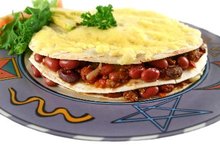What does fact checked mean?
At Healthfully, we strive to deliver objective content that is accurate and up-to-date. Our team periodically reviews articles in order to ensure content quality. The sources cited below consist of evidence from peer-reviewed journals, prominent medical organizations, academic associations, and government data.
The information contained on this site is for informational purposes only, and should not be used as a substitute for the advice of a professional health care provider. Please check with the appropriate physician regarding health questions and concerns. Although we strive to deliver accurate and up-to-date information, no guarantee to that effect is made.
The Importance of Bread
Bread has ancient roots, and is a staple of many diets throughout the world, from thriving metropolises to developing nations. Bread comes in all shapes, flavors and forms, and is typically made from accessible and affordable ingredients. These ingredients are important because they help fill nutritional gaps in the diet as well as help you feel full and satisfied.
Carbohydrates
Breads of all types are a prime source of carbohydrates. Carbohydrates play an essential role in the body as a preferred source for energy and your body's main source of fuel. When you digest carbohydrates, your body can break the carbohydrate down into glucose. Glucose is then combined with oxygen in the cell's mitochondria to create energy through aerobic respiration.
- Breads of all types are a prime source of carbohydrates.
- Carbohydrates play an essential role in the body as a preferred source for energy and your body's main source of fuel.
Fiber
Are Whole-Wheat Tortillas Healthy?
Learn More
The fiber in breads is a type of carbohydrate that your body is unable to digest, but at the same time still plays an important role in your body. Breads can contain both soluble and insoluble fibers. Soluble fibers create a gel-like substance in your digestive tract which helps block the absorption of bad cholesterol into your bloodstream, as well as help with blood sugar regulation. Insoluble fiber helps improve the health of your digestive tract and provides bulk to your stool, which can help prevent problems like constipation. Fiber is typically found in higher amounts in whole grain breads versus processed grain breads such as white bread.
- The fiber in breads is a type of carbohydrate that your body is unable to digest, but at the same time still plays an important role in your body.
- Insoluble fiber helps improve the health of your digestive tract and provides bulk to your stool, which can help prevent problems like constipation.
Fat
Breads typically also contain varying levels of fat, which also play an important role in your body. Fat is necessary for cell health because without fat your cells would not be able to maintain the cell membrane, causing them to die. Fats also are needed to help your body absorb certain fat-soluble vitamins including vitamins A, E, D and K. Not all fats are created equal. Both unsaturated fats and less healthful saturated fats can be found in breads, and in some cases bread products can also contain the even more unhealthy trans-fats. When including breads in your diet, aim for products low in saturated fats and absent of trans-fats.
- Breads typically also contain varying levels of fat, which also play an important role in your body.
- Fats also are needed to help your body absorb certain fat-soluble vitamins including vitamins A, E, D and K. Not all fats are created equal.
Protein
List of Complex Sugars
Learn More
Protein can also be found in most breads. Protein is a necessary part of your diet because it contains amino acids, which are essential to maintaining muscle. Protein plays an essential role throughout your body, especially in relation to building the various tissues in your body. Protein is also important for healthful immune system function as well as for creating enzymes and hormones.
- Protein can also be found in most breads.
- Protein is also important for healthful immune system function as well as for creating enzymes and hormones.
Vitamins and Minerals
Depending on the ingredients used to make bread, the finished product can contain a range of essential vitamins and minerals 3. Breads can also be fortified with vitamins and minerals to increase their nutritional content 3.
Related Articles
References
- History Magazine: Bread
- MayoClinic.com: Dietary Fiber -- Essential for a Healthy Diet
- Grain Information Service: Vitamins and Minerals
- Ye EQ, Chacko SA, Chou EL, Kugizaki M, Liu S. Greater whole-grain intake is associated with lower risk of type 2 diabetes, cardiovascular disease, and weight gain. J Nutr. 2012;142(7):1304-13. doi:10.3945/jn.111.155325
- Centers for Disease Control and Prevention. Study of U.S. adults finds strong association between higher sodium excretion and higher blood pressure and association between higher potassium excretion and lower blood pressure. Updated February 28, 2018.
- U.S. Food & Drug Administration. Azodicarbonamide (ADA) frequently asked questions. Updated January 4, 2018.
- Mofidi A, Ferraro ZM, Stewart KA, et al. The acute impact of ingestion of sourdough and whole-grain breads on blood glucose, insulin, and incretins in overweight and obese men. J Nutr Metab. 2012;2012:184710. doi:10.1155/2012/184710
- Rezac S, Kok CR, Heermann M, Hutkins R. Fermented foods as a dietary source of live organisms. Front Microbiol. 2018;9:1785. doi:10.3389/fmicb.2018.01785
Writer Bio
Chris Sherwood is a professional journalist who after years in the health administration field and writing health and wellness articles turned towards organic sustainable gardening and food education. He now owns and operates an organic-method small farm focusing his research and writing on both organic gardening methods and hydroponics.









